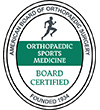An individualized approach to improve surgical outcomes after shoulder dislocation
A dislocated shoulder is a common sports injury that can occur with a single swing of the tennis racket or an awkward fall on the field. Though popping the bone back into the socket may seem like a simple solution, the reality is more complex.
What can cause pain in the back of the knee when straightening the leg?
When a person experiences pain in the back of their knee when straightening their leg, it is called posterior knee pain. Pain in the back of the knee, called the popliteal fossa, is common, but there is a wide range of causes, ranging from ligament injury to arthritis.
Athletes: What to Do When You Get Hurt
Whether you’re a weekend warrior, competitive athlete, regular recreational exerciser or simply an active individual, you know a nagging tendonitis or skin infection can halt you in your tracks. Instead of toughing it out, a sports medicine physician can get you back to an active lifestyle.
What Do Surgeons Need to Know About Pain Management After Shoulder Surgery?
Dr. Vani Sabesan answers ICJR’s questions about multimodal pain management following shoulder procedures, the role of patient education, and how state laws are changing opioid prescribing habits.
The 8 best knee stretches and exercises for knee pain relief
Lower body strengthening exercises may offload unwanted stressors on the knee joint by improving shock absorption through enhanced muscle strength.
New research questions use of cryotherapy in football injury recovery
New research has revealed a potential pitfall when it comes to the use of cryotherapy chambers to protect top flight footballers from injury. And the routine use of this extreme cold temperature treatment needs to be re-assessed. That's according to new research led by experts from Liverpool Hope University.
How to treat a bruised knee
Most bruises, also known as contusions, are mild and heal on their own. However, more severe contusions can damage muscle tissue or bone, which may take longer to heal.
Tips for Treating Your Bicep Pain at Home
The bicep muscle is one of the most important muscles for your upper body strength. An injury to this hardworking muscle can make day-to-day tasks difficult.
Why physical activity matters now more than ever
Exercise not only helps people with long-term conditions better manage their health but also boosts the immune system. So how can we support more people to be physically active?
10 Massages and Stretches for a Frozen Shoulder
Frozen shoulder syndrome occurs when the mobility of your shoulder joint is restricted to the degree that it feels frozen in place. The limited range of motion of your shoulder joint makes it difficult or painful to perform certain movements. To regain mobility, you must create an effective treatment plan involving stretching and massage.





